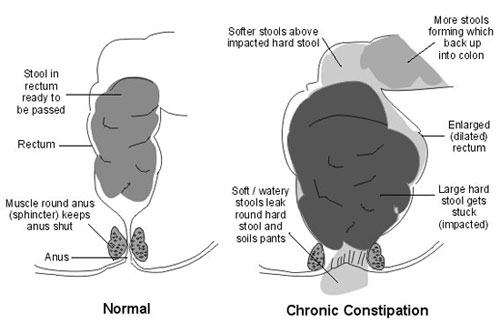Faecal incontinence is the medical term for soiling in children over the age of four years. In most cases faecal incontinence develops as a result of long standing constipation.
The build up of poo in the bowel and rectum results in the bowel getting so stretched that it is unable to register that there is a poo. As a result the usual signal to the brain that they need to go to the toilet is not sent and often the poo comes out catching the child unawares. We call this 'sneaky poo'.

Sneaky poo is new, soft poo that moves down the bowel oozing around the hard poo and trickling out. Children with faecal incontinence often wet (day or night) as the constantly full rectum affects bladder functioning. Urinary tract infections as a result of this are also common.
First step - have your child assessed by their doctor.
Management
The general rule of thumb is that it will take AT LEAST as long to resolve the problem fully as it did to get constipated, so plan to be managing the problem for months at best to several years at worst.
- Empty the large intestine and rectum
This is done using softening and stimulating laxatives. These may initially be at frequent, high doses. It will be messy as the old poo comes out so it is best to keep the child home from school while this part of the treatment is carried out. - Establish regular bowel movements
This is done by using daily doses of laxatives, sitting on the toilet 15-20 minutes after meals to make the most of the gastrocholic reflex (which increases colonic motility when food passes from the stomach into the upper part of the small intestine), and using a foot stool to relax the pelvic floor muscles when passing a poo.
Keeping track of the poo is important so you will need to keep a poo chart (downloadable from the KEEA pages on the Continence NZ website). - Maintain regular bowel movements long term
Maintenance doses of laxatives, the dose adjusted as needed, are used.
Be alert for signs that the child is becoming constipated again – flatulence, bad breath, soiling underpants, urinary tract infection, sore tummies.
